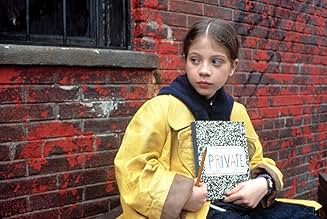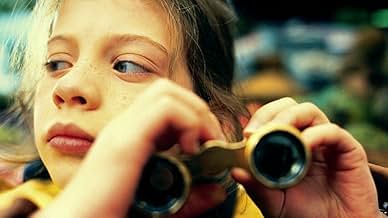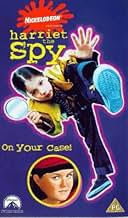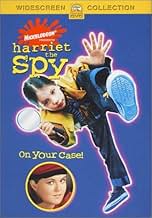VALUTAZIONE IMDb
6,0/10
11.531
LA TUA VALUTAZIONE
Harriet M. Welsch è probabilmente la spia undicenne più abile del mondo. Harriet sogna di diventare una scrittrice, e la sua tata e miglior amica Golly le suggerisce di cominciare a scrivere... Leggi tuttoHarriet M. Welsch è probabilmente la spia undicenne più abile del mondo. Harriet sogna di diventare una scrittrice, e la sua tata e miglior amica Golly le suggerisce di cominciare a scrivere tutto ciò che osserva.Harriet M. Welsch è probabilmente la spia undicenne più abile del mondo. Harriet sogna di diventare una scrittrice, e la sua tata e miglior amica Golly le suggerisce di cominciare a scrivere tutto ciò che osserva.
- Premi
- 3 vittorie e 2 candidature totali
Vanessa Chester
- Janie Gibbs
- (as Vanessa Lee Chester)
Trama
Lo sapevi?
- QuizNickelodeon's first feature film.
- BlooperThis film is set in New York City, yet in scenes such as the "kids yelling and chasing Harriet through town" segment, landmarks unique to Toronto, the capital city, are featured blatantly, including a flowerbed in the park shaped like the Canadian maple leaf, and background shots of buildings recognized worldwide as Toronto's architecture.
- Curiosità sui creditiDuring the opening credits, items from Harriet's spy kit (i.e. magnifying glass, flashlight, and compass) are seen interacting with the credits as they appear.
- Colonne sonoreWack Wack
Written by Eldee Young, Hysear Walker, Isaac Holt & Donald Storball (as Don Storball)
Performed by The Young Holt Trio (as Young-Holt Unlimited)
Courtesy of Brunswick Record Corp.
Recensione in evidenza
This little film has been roundly criticized for being disjointed and amateurish.
Well, it _is_ disjointed: part of it is surreal allegory, part realistic morality play. Part of it moves with a natural rhythm while other parts seem to have been transplanted from afternoon TeeVee. Some is done with a cartoon cosmology, and the rest is straight from Marlo Thomas' heart. Distributed throughout are mottles of bad acting and unconsidered dialog.
And I loved it all. Why?
Because this is in the tradition of movies and books that generate themselves. Rather, the characters in the stories play double duty as the authors of the story and the creators of the world that surrounds it. So it makes sense as precisely what a preteen would imagine her older self writing about her.
Indeed, the whole thing is a meditation on how someone might abstract the world (for writing) without a mature faculty for abstraction which is to say how a kid would imagine an adult's mind imagining a kid's mind.
Its all about the deep problems of writing. I imagine the author of the original book sitting down and having trouble writing, them ruminating about why on the page.
Therefore, we have a youthful experimenter, a blocked writer, a "gardener" who makes environments from trash, another maker of environments (cages) who craves companionship, a woman who lives in a cage (Kitt), the Dad who is a movie comedian, together with lesser characters.
And the spy who spies so she can write what we see. It is all about sight and callow abstraction, just what movies were made for. Sure, it differs from the book because film can amplify what the book cannot. The adapter (the guy that did the game as life as game "Jumanji" project) understood this.
Ted's Evaluation -- 3 of 3: Worth watching.
Well, it _is_ disjointed: part of it is surreal allegory, part realistic morality play. Part of it moves with a natural rhythm while other parts seem to have been transplanted from afternoon TeeVee. Some is done with a cartoon cosmology, and the rest is straight from Marlo Thomas' heart. Distributed throughout are mottles of bad acting and unconsidered dialog.
And I loved it all. Why?
Because this is in the tradition of movies and books that generate themselves. Rather, the characters in the stories play double duty as the authors of the story and the creators of the world that surrounds it. So it makes sense as precisely what a preteen would imagine her older self writing about her.
Indeed, the whole thing is a meditation on how someone might abstract the world (for writing) without a mature faculty for abstraction which is to say how a kid would imagine an adult's mind imagining a kid's mind.
Its all about the deep problems of writing. I imagine the author of the original book sitting down and having trouble writing, them ruminating about why on the page.
Therefore, we have a youthful experimenter, a blocked writer, a "gardener" who makes environments from trash, another maker of environments (cages) who craves companionship, a woman who lives in a cage (Kitt), the Dad who is a movie comedian, together with lesser characters.
And the spy who spies so she can write what we see. It is all about sight and callow abstraction, just what movies were made for. Sure, it differs from the book because film can amplify what the book cannot. The adapter (the guy that did the game as life as game "Jumanji" project) understood this.
Ted's Evaluation -- 3 of 3: Worth watching.
I più visti
Accedi per valutare e creare un elenco di titoli salvati per ottenere consigli personalizzati
Dettagli
Botteghino
- Budget
- 12.000.000 USD (previsto)
- Lordo Stati Uniti e Canada
- 26.570.048 USD
- Fine settimana di apertura Stati Uniti e Canada
- 6.601.651 USD
- 14 lug 1996
- Lordo in tutto il mondo
- 26.570.048 USD
- Tempo di esecuzione1 ora 40 minuti
- Colore
- Mix di suoni
- Proporzioni
- 1.85 : 1
Contribuisci a questa pagina
Suggerisci una modifica o aggiungi i contenuti mancanti

Divario superiore
By what name was Harriet, la spia (1996) officially released in India in Hindi?
Rispondi

































